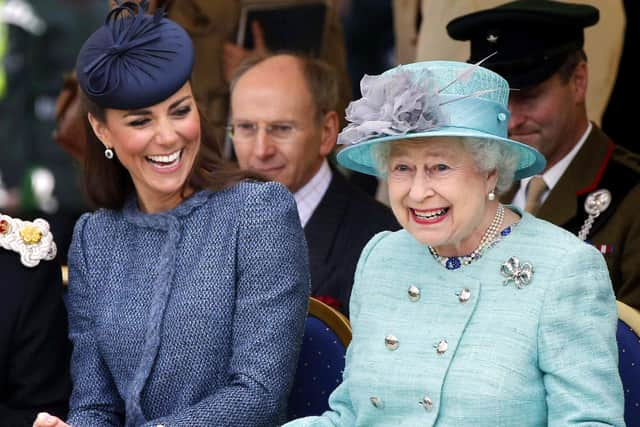Wealth of Queen Elizabeth II and King Charles III: Economist Esmond Birnie and People Before Profit leader Gerry Carroll debate whether royals are worth the money
and live on Freeview channel 276
The Queen’s personal fortune was some £370m, however the Royal Collection of art, most royal residences and the Crown Jewels were not hers personally but kept in trust for her successors and the nation.
Her main income last year was the Sovereign Grant of £86m and The Privy Purse of £24m. These came from the Crown Estate, worth £15bn, and the Duchy of Lancaster estate, worth £600m, again, both owned by ‘the sovereign’, and not her personally.
Advertisement
Hide AdAdvertisement
Hide AdTourism from palaces earned just £9.4m last year, however royalists argue that the value of the royal brand to the UK is less quantifiable, lending diplomats and businesses soft power overseas.


NI Economist Esmond Birnie likened the economic argument for the royals to valuing Shakespeare for modern Britain. If the royals cost £100m annually, he said, that is “less than one-thousandth of the annual cost of the NHS”.
If royal assets were all nationalised “would the rest of us be much better off as a result?” he asked. The royal art collection is already owned by a charitable commission, he noted.
Inheritance tax would quickly strip down their wealth, but then how would the royals perform their functions, he asked, suggesting many palaces and works of art would “pass into the ownership of Middle Eastern wealth funds”.
Advertisement
Hide AdAdvertisement
Hide AdHe added that sometimes “you cannot really assign a cash value”.
Arguably, he said, the two big benefits of the UK’s constitutional arrangement are “a transfer of head of state which is very orderly and peaceful” compared to other countries and which “keeps us in touch with over a 1000 years of English, Scottish, Welsh and Irish history”.
But People Before Profit leader Gerry Carroll firmly disagreed, saying much of the debate can be summed up by phrases such as, ‘They bring in more than they get’ and ‘They work hard to earn their share’.
“But this isn’t an exercise in ensuring we have enough to fund a vital service provided by key workers, and we shouldn’t allow it to be portrayed as such,” he said. “The public fork out millions every year to renovate the homes of dukes; to fund the private jets of those who daren’t sit next to the hoi polloi; to ensure their clobber is hand stitched by the finest home-grown designers.
Advertisement
Hide AdAdvertisement
Hide Ad“As inequality deepens, people are working more for less and the social security net is eroded for those who desperately need it. In this context, it is right to say that up to hundreds of millions given to keep the royals in their finest and their palaces warm would be better spent elsewhere.”
He added: “It benefits a tiny minority to keep these principles of the status quo unchallenged. On the contrary the masses are hurt by the status quo, so why should we pay to protect it?” There is no monarch ruling from the renowned French palace of Versailles, but this doesn’t stop tourists coming “in their droves” he added.